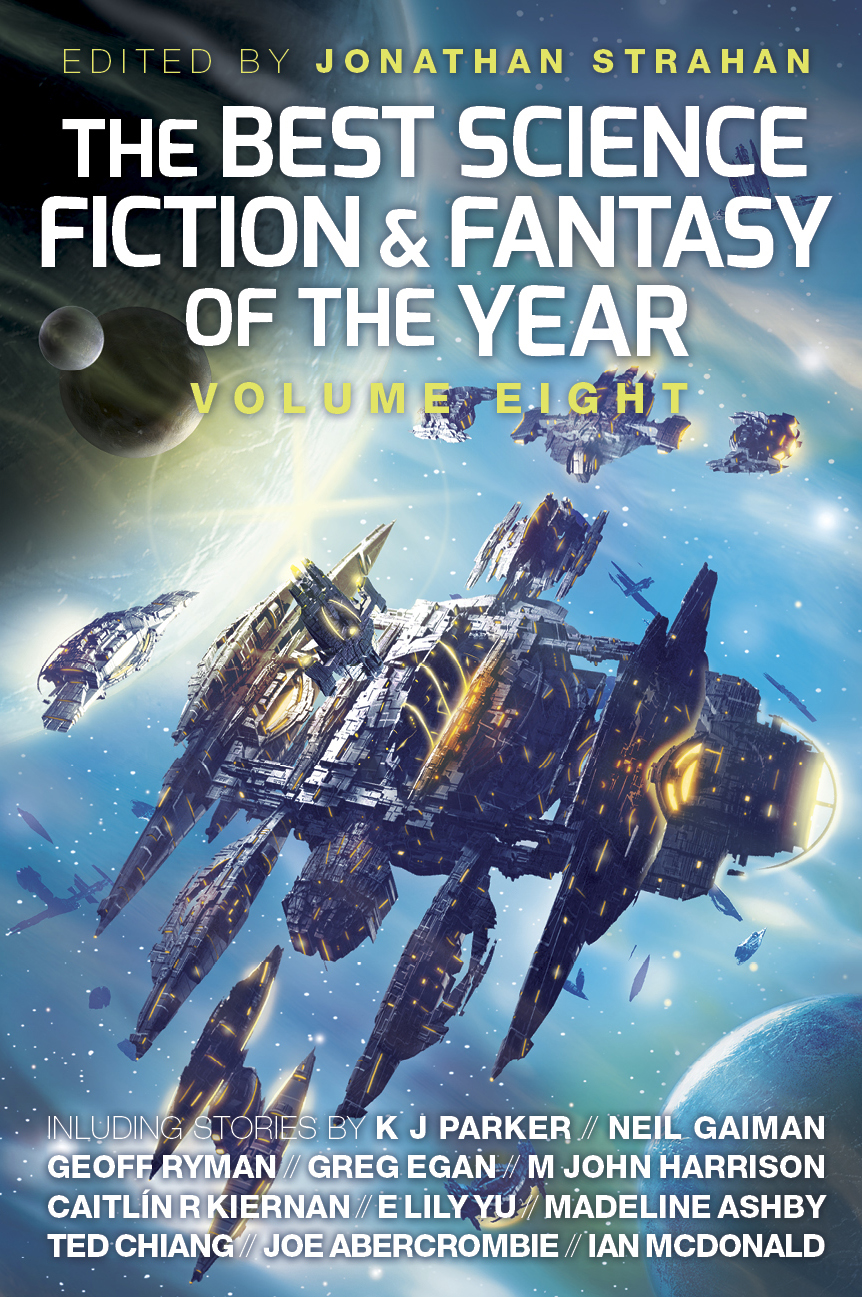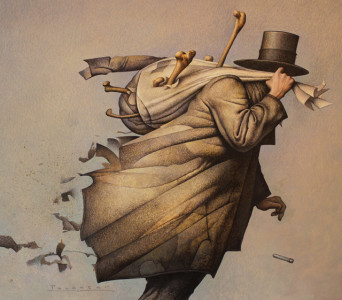 When it comes to anthologies, it’s almost unheard of that I enjoy every story. So it was an enormous pleasure and surprise to find that this was the case with The Best Science Fiction and Fantasy of the Year: Volume 8. And if my review seems like a rave, number 1 with a bullet, chart topper it’s only because editor Jonathan Strahan and the authors he chose to include left me without the choice to do otherwise. There were several stories, to be fair, that I was less enthusiastic about than others, but my reservations were in truth rather minor.
When it comes to anthologies, it’s almost unheard of that I enjoy every story. So it was an enormous pleasure and surprise to find that this was the case with The Best Science Fiction and Fantasy of the Year: Volume 8. And if my review seems like a rave, number 1 with a bullet, chart topper it’s only because editor Jonathan Strahan and the authors he chose to include left me without the choice to do otherwise. There were several stories, to be fair, that I was less enthusiastic about than others, but my reservations were in truth rather minor.
Strahan has not only made a finely judged selection of fantasy, science fiction and interstitial works here, but he’s grouped some of them according to theme, or or other elements. Here you will find a new twist on the fairytale next to a sideways look at a children’s classic novel; paired science fiction or fantasy stories from non-Western perspectives; and dystopian futures and dark pasts that have much to say about the way we live now.
The anthology contains adventure and magic galore, but balanced with deeper hues, spiritual, emotional, and political. There are anti war stories, for example, such as the heartbreaking In Metal, In Bone by An Owomoyelya, about a man who can see war victim’s lives through their human remains; startlingly-original mythopoetic tales such as the eerie The Herons of Mer De L’Ouest by M. Bennardo, and Eleanor Arnason’s Kormak the Lucky — of the latter, words fail me because her story of a human slave to elves and fey, its tales within tales, its shaggy dog ramblings and its elements of steampunk completely blew me away; and hard science fiction with a profoundly human heart, such as Ian R. Macleod’s Entangled, about an outsider in a world in which people communally connect minds.
The volume kicks off with Joe Abercrombie’s intense fantasy western, Some Desperado, which I already reviewed favourably from its appearance in the Dangerous Women anthology.
It’s always good to read work which doesn’t have a Western perspective. In Zero for Conduct Greg Egan does a great job of describing the life of a chemistry-obsessed Afghani schoolgirl in Iran. Latifa seems unfazed by being ostracised by fellow pupils because of her background. She focusses herself on a potentially world-changing project, creating a superconductor that works at room temperature. The hard science is put in the context of a politically complex story which demonstrates that people in other cultures — with whom we have been at war or might regard as the dangerous “other” — are, in the end, just the same as us.
Yoon Ha Lees’ poetic and wildly-imaginative Effigy Nights demonstrates that the pen is, quite literally, mightier than the sword.
Geoff Ryman, who’s realistic and painful reimagining of The Wizard of Oz, Was, is a favourite novel of mine, brings us Rosary and Goldenstar, real life versions Hamlet’s sidekicks, Rozencrantz and Guildenstern. A wittty and often funny speculative piece in which philosophy, astronomy, mathematics and poetry are discussed, while Shakespeare makes the transition from poet to playwright.
Neil Gaiman, as is his wont, de-Disneyfies the fairytale and returns it to its dark roots in, The Sleeper and the Spindle, a sequel of sorts to Snow White and the Seven Dwarves, with references to other tales along the way.
M. John Harrison’s Cave and Julia is an account of a strange relationship between a visitor to, and a resident of, an imaginary island placed in the real world. In Harrison’s brilliantly original writings, place is every bit as important as character, and his richly-layered, highly visual prose takes us on another disturbing excursion into a psychic landscape just off to one side of the familiar.
Ramez Naam’s Water shows us one potential future for marketing. Aside from a dull section or two about the mechanics of the stock market, the story is both gripping and worryingly plausible.
Ted Chiang’s The Truth of Fact, The Truth of Feeling, asks some profound questions about whether digital memories might not challenge our sense of self and who we believe we truly are.
The Ink Readers of Doi Saket by Thomas Olde Houvelt is a subtle fantasy about the meaning of wishes and reminds us to be careful about what we wish for.
Cherry Blossoms on the River of Souls by Richard Parks (one of those story groupings I mentioned earlier, a fine partner to the Houvelt) reads like a fable. The afterlife and reincarnation are chillingly evoked.
Priya Sarma’s Rag and Bone is a highly unusual historical fantasy set in Liverpool. It involves rich people who believe human remains can prolong their lives, and are willing to pay for them, gender swapping, and a tough and tender love story at its core. This felt to me like it should have been (or should be) a novel – almost taking on too much in such a short space. But if Priya writes the novel version, I’ll definitely be picking it up.
Rag-and-bone men also make a fleeting appearance in Lavie Tidhar’s The Book Seller. A book seller, with a particular fondness for collectible editions of extremely rare Jewish pulp fiction, meets an alien woman whom I can only describe as a data vampire. Books and book sellers being so beloved of mainstream literati right now, it’s good to see the topic handled so expertly in genre fiction. I had similar feelings about this as I did about the Sarma story, incident and detail piling on top of each other, great though it is, could have used some more breathing space.
In The Sun and I, K.J. Parker shows us with acid wit how a group of down-on-their-luck students set about, and succeed, in creating God.
James Patrick Kelly gives us in The Promise of Space a dialogue between a woman and her ex-astronaut husband. She tries to hold on to a relationship in which her hospitalised husband may only be a virtual version of the original. The story raises similar questions to the earlier Chiang one, and is both smart in its speculative elements and moving in its humanity.
If someone created the most perfect magic spell ever, but no one knew what it was, what effect would it have? Charlie Jane Anders’s The Master Conjurer examines the flimsy nature of celebrity and the value, or otherwise, of magic in the world.
The Pilgrim and the Angel by E. Lily Yu is a subtle and humorous magical realist tale about an Egyptian coffee shop owner visited by the angel Gabriel. What’s more important in the end: the demands of a godlike being, or your family?
Fade to Gold by Benjanun Stiruangkaew could easily be an episode from the great Indian epic, The Mahabharata. It involves the painful aftermath of war and a vampiric creature who creates in the reader a sense of empathy rather than fear or revulsion.
Sofia Samatar’s Selkie Stories are for Losers tackles the sometimes painful or uncomfortable relationship between mothers and daughters and reminds us that, even though we may on one level become domesticated, we may still long for the wildness of the sea.
The offworlder who tries to integrate with a very alien culture in Karen Tidbeck’s highly unusual tale, Sing, discovers there’s a price to pay for a his lack of true understanding.
A future in which Social Services (by Madeline Ashby) is supported by sophisticated technology somehow cannot change the darkest aspects of human behaviour. A story with a brisky horrific sting in its tail.
A while back one of my own stories (Dr. North’s Wound) appeared alongside a tale (Galapagos) by Caitlin R. Kiernan on the Starship Sofa podcast, and first introduced me to this tremendous writer. Her story here, The Road of Needles, sees spacefaring technician, Nix, facing potential disaster in the void, as well as trying to keep her family together. She finds aid from an unexpected source, Little Red Riding Hood, no less, or at least one version of her. The meshing of science fiction, fairytale and human drama works really well, though I can’t pretend I understood the hard SF elements completely – may need a closer reading.
In Robert Reed’s Mystic Falls a parasitic virus in the form of a girl everyone wants to know “invades the days and foibles of forty billion unprotected lives.” Part detective story, part techno thriller, this is a cautionary, disturbing vision of social media gone badly wrong.
The anthology rounds out with two wonderful, blarney-laden Irish stories which invoke the wit, wisdom and extravagant imagination of the great Irish writer Flann O’Brien.
First is Ian Macdonald’s The Queen of Night’s Aria in which flamboyant tenor James Fitzgerald and his long-suffering accompanist flounce about Mars, performing in desultory army bases. Beset by unappreciative audiences, Wellesian tripods, complete with death rays, and subterannean tentacled monsters, the singer finally finds the adulation he so earnestly desires — in the place he least expects. The denoument is laugh-out-loud hilarious (as is much else in the story).
Finally, we have Val Nolan’s The Irish Astronaut, a slice of life episode in the life of American astronaut, Dale, finding himself a fish out of water on the ancestral shores of a colleague who has died in an horrific capsule re-entry accident. Sly, funny and warm, and, though low key and modest, a fine way to end to a truly outstanding collection.
This week’s giveaway: 5 ebook copies of Salt by Colin F. Barnes and 3 paper copies of The Best Science Fiction and Fantasy of the Year Volume 8 by Jonathan Strahan. To win, sign up for our newsletter. Giveaway ends next Monday at 11:59 PM CDT. Worldwide entries!
—————————————————————————————————————————————————
John Dodds is the author of The Kendrick Chronicles crime novels (Bone Machines and Kali’s Kiss ) and is currently completing the third novel in the series, Babylon Slide. Under a pseudonym, JT Macleod, has written a collection of historical/paranormal/erotic/romance stories called Warriors and Wenches, as well as the first novel in YA steampunk superhero series which he is shopping around agents. You can hear some of his short stories on podcasts such as Tales to Terrify, Starship Sofa and others. John also blogs for Amazing Stories Magazine.
Subscribe to Adventures in SciFi Publishing podcast on: iTunes | Stitcher Radio (Android users) | RSS | Website RSS | Newsletter (Subcribers are entered on giveaways)



















Very comprehensive review! I’m still making my way through this while my TBR pile is constantly on tilt. Did you have a favorite?
I didn’t have a favourite, Peter, though there were several that were the best of the best for me: Kormak the Lucky; In Metal, In Bone; The Queen of Night’s Aria; Zero for Conduct; and Cave and Julia.